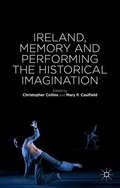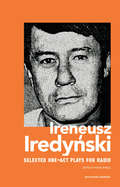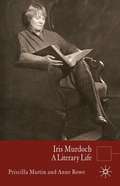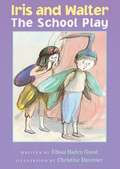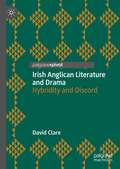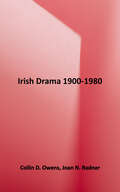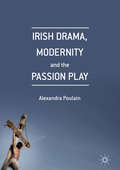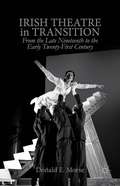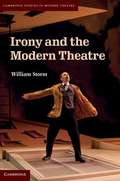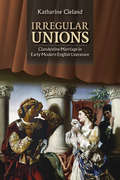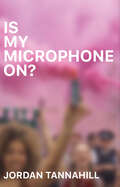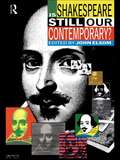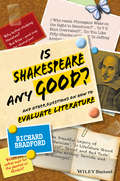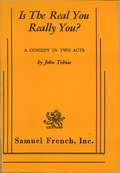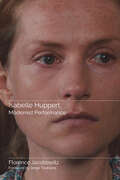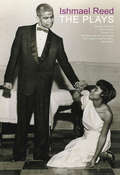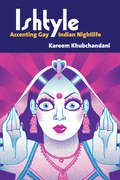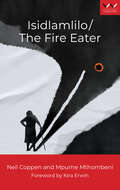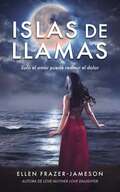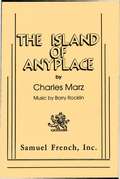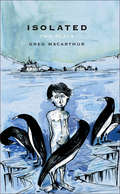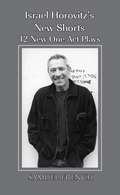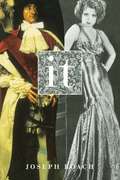- Table View
- List View
Ireland, Memory and Performing the Historical Imagination
by Christopher Collins Mary P. CaulfieldThis book explores the performance of Irish collective memories and forgotten histories. It proposes an alternative and more comprehensive criterion of Irish theatre practices. These practices can be defined as the 'rejected', contested and undervalued plays and performativities that are integral to Ireland's political and cultural landscapes.
Ireneusz Iredynski: Selected One-Act Plays for Radio
by Kevin WindleThis vibrant anthology of radio plays features works by one of Poland's 'angry young men' playwrights. Ireneusz Iredynski made his début in literature as a Polish 'angry young man' in the late 1950s. He moved with great versatility from verse to stage plays, film-scripts and plays for radio. While some of the plays in this collection seem to present a bleak view of life, they show a gentler side of Iredynski. Here it is people's dreams rather than their worst nightmares that are explored. In these plays, situations are kept simple and the theatrical technique is spare and economical, but yet, the playwright demonstrates an unfailing theatrical flair and shows himself a master of dramatic tension and the final unexpected twist.
Iris Murdoch: A Literary Life
by Anne Rowe Priscilla MartinThis largely chronological study of Iris Murdoch's literary life begins with her fledgling publications at Badminton School and Oxford, and her Irish heritage. It moves through the novels of the next four decades and concludes with an account of the biographical, critical and media attention given to her life and work since her death in 1999.
Iris and Walter: The School Play
by Elissa Haden Guest Christine DavenierIris and Walter can't wait for opening day of their first school play. Walter helps Iris make her costume. Iris helps Walter practice his lines. But when Iris wakes up sick on the morning of their debut, it looks like the curtain is going up on a big disappointment. . . .
Irish Anglican Literature and Drama: Hybridity and Discord
by David ClareThis book discusses key works by important writers from Church of Ireland backgrounds (from Farquhar and Swift to Beckett and Bardwell), in order to demonstrate that writers from this Irish subculture have a unique socio-political viewpoint which is imperfectly understood. The Anglican Ascendancy was historically referred to as a “middle nation” between Ireland and Britain, and this book is an examination of the various ways in which Irish Anglican writers have signalled their Irish/British hybridity. “British” elements in their work are pointed out, but so are manifestations of their proud Irishness and what Elizabeth Bowen called her community’s “subtle … anti-Englishness.” Crucially, this book discusses several writers often excluded from the “truly” Irish canon, including (among others) Laurence Sterne, Elizabeth Griffith, and C.S. Lewis.
Irish Drama, 1900-1980
by Coilin D. Owens Joan N. RadnerThis superb collection of eighteen plays has long been needed. It provides a sound and solid introduction to the rich field of modern Irish drama and should be as delightful to the private reader as it will be useful for university classes. The Journal of Irish Literature Contents: Spreading the News and The Gaol Gate - Lady Gregory; On Baile's Strand and the Only Jealousy of Emer -W.B. Yeats; The Land -Padraic Colum; The Playboy of the Western World -J.M. Synge; Maurice Harr -T. C. Murray; The Magic Glasses -George Fitzmaurice; Juno and the Paycock -Sean O'Casey; The Big House -Lennox Robinson; The Old Lady Says "No!" -Denis Johnston; As the Crow Flies -Austin Clarke; The Paddy Pedlar -M. J. Malloy; The Vision of Mac Conglinne -Padraic Fallon; The Quare Fellow -Brendan Behan; All that Fall -Samuel Becket; Da -Hugh Leonard; Translations -Brian Friel
Irish Drama, Modernity and the Passion Play
by Alexandra PoulainThis book discusses Irish Passion plays (plays that rewrite or parody the story of the Passion of Christ) in modern Irish drama from the Irish Literary Revival to the present day. It offers innovative readings of such canonical plays as J. M. Synge's The Playboy of the Western World, W. B. Yeats's Calvary, Brendan Behan's The Hostage, Samuel Beckett's Endgame, Brian Friel's Faith Healer and Tom Murphy's Bailegangaire, as well as of less well-known plays by Padraic Pearse, Lady Gregory, G. B. Shaw, Se#65533;n O'Casey, Denis Johnston, Samuel Beckett and David Lloyd. Challenging revisionist readings of the rhetoric of "blood sacrifice" and martyrdom in the Irish Republican tradition, it argues that the Passion play is a powerful political genre which centres on the staged death of the (usually male) protagonist, and makes visible the usually invisible violence perpetrated both by colonial power and by the postcolonial state in the name of modernity.
Irish Drama, Modernity and the Passion Play
by Alexandra PoulainThis book discusses Irish Passion plays (plays that rewrite or parody the story of the Passion of Christ) in modern Irish drama from the Irish Literary Revival to the present day. It offers innovative readings of such canonical plays as J. M. Synge’s The Playboy of the Western World, W. B. Yeats’s Calvary, Brendan Behan’s The Hostage, Samuel Beckett’s Endgame, Brian Friel’s Faith Healer and Tom Murphy’s Bailegangaire, as well as of less well-known plays by Padraic Pearse, Lady Gregory, G. B. Shaw, Seán O’Casey, Denis Johnston, Samuel Beckett and David Lloyd. Challenging revisionist readings of the rhetoric of “blood sacrifice” and martyrdom in the Irish Republican tradition, it argues that the Passion play is a powerful political genre which centres on the staged death of the (usually male) protagonist, and makes visible the usually invisible violence perpetrated both by colonial power and by the postcolonial state in the name of modernity.
Irish Theatre in Transition
by Donald E. MorseThe Irish Theatre in Transition explores the ever-changing Irish Theatre from its inception to its vibrant modern-day reality. This book shows some of the myriad forms of transition and how Irish theatre reflects the changing conditions of a changing society and nation.
Irony and the Modern Theatre
by William StormIrony and theatre share intimate kinships, not only regarding dramatic conflict, dialectic or wittiness, but also scenic structure and the verbal or situational ironies that typically mark theatrical speech and action. Yet irony today, in aesthetic, literary and philosophical contexts especially, is often regarded with skepticism - as ungraspable, or elusive to the point of confounding. Countering this tendency, Storm advocates a wide-angle view of this master trope, exploring the ironic in major works by playwrights including Chekhov, Pirandello and Brecht, and in notable relation to well-known representative characters in drama from Ibsen's Halvard Solness to Stoppard's Septimus Hodge and Wasserstein's Heidi Holland. To the degree that irony is existential, its presence in the theatre relates directly to the circumstances and the expressiveness of the characters on stage. This study investigates how these key figures enact, embody, represent and personify the ironic in myriad situations in the modern and contemporary theatre.
Irregular Unions: Clandestine Marriage in Early Modern English Literature
by Katharine ClelandKatharine Cleland's Irregular Unions provides the first sustained literary history of clandestine marriage in early modern England and reveals its controversial nature in the wake of the Elizabethan Religious Settlement, which standardized the marriage ritual for the first time. Cleland examines many examples of clandestine marriage across genres. Discussing such classic works as The Faerie Queene, Othello, and The Merchant of Venice, she argues that early modern authors used clandestine marriage to explore the intersection between the self and the marriage ritual in post-Reformation England.The ways in which authors grappled with the political and social complexities of clandestine marriage, Cleland finds, suggest that these narratives were far more than interesting plot devices or scandalous stories ripped from the headlines. Instead, after the Reformation, fictions of clandestine marriage allowed early modern authors to explore topics of identity formation in new and different ways.Thanks to generous funding from Virginia Tech and its participation in TOME (Toward an Open Monograph Ecosystem), the ebook editions of this book are available as Open Access volumes from Cornell Open (cornellopen.org) and other repositories.
Is My Microphone On?
by Jordan TannahillIn another life I was a small bubble of foam on a wave coming to shore, and the wave broke, and I burst, and that was it. Before that I was a small stream, for centuries. And in another life I was a mortal girl. Which is this life. After thousands of years, I have a mouth. So if you don’t mind, Mom, Dad, I’m going to speak. I’m going to shout. When I become a human I’m going to use some words. Can you still hear me? Is my microphone on?Young people have inherited a burning world. In this urgent and lyrical play, they reckon with the generations who have come before them, questioning the choices that have been made, and the ones that they will yet be forced to make. Is My Microphone On? is a play in the form of a protest song, in which a chorus of young performers hold the audience to account, and invite them to experience the world together anew.
Is Shakespeare Still Our Contemporary?
by John ElsomFirst published in 2004. Routledge is an imprint of Taylor & Francis, an informa company.
Is Shakespeare any Good?: And Other Questions on How to Evaluate Literature
by Richard BradfordIs Shakespeare any Good? reveals why certain literary works and authors are treated as superior to others, and questions the literary establishment’s criteria for creating an imperium of “great” writers. Enables readers to articulate and formulate their own arguments about the quality of literature – including works that convention forbids us to dislike Dismantles the claims of academic criticism – particularly Theory – to tell us anything useful about why we like or appreciate literature Challenges and shatters many longstanding beliefs about literature and its evaluation Poses serious questions about the value of literature, and studying literature, and presents these in a lively and entertainingly provocative manner
Is the Real You Really You?
by John TobiasComedy / 2m, 2f /InteriorHarold arrives home one night, discusses the kids, what's for supper, etc. with his wife, Honey- until he realizes he is the wrong husband, she is the wrong wife and he is in the wrong apartment. So begins this hilarious comedy about love, the life force and the real you in this age of shifting sexual roles and future shock. Honey becomes entangled with Harold, with her tranquilized real husband, Henry- who instead of acting like a betrayed spouse tries to sell everyone life insurance- and with Harold's real wife, Gloria, who wins him back by reversing roles and emerging as the seductive other woman. The climax is a comic on stage fight in which everyone relieves their pent up frustrations.
Isabel: Taking Wing (Girls Of Many Lands)
by Annie DaltonIn 1592, twelve-year-old Isabel dreams of adventure and finds it, not only on her journey from her London home to her aunt's manor house in Northamptonshire, but also through the healing arts her aunt teaches her.
Isabelle Huppert, Modernist Performance
by Florence JacobowitzIsabelle Huppert's modernist performance style illustrated through detailed readings of key films, demonstrating her immense social impact. Isabelle Huppert's oeuvre constitutes perhaps the most significant feminist body of work to have emerged in the wake of the second wave of the women's movement, a period of intense social change. The emphasis on autonomy, or the "anti-victim," which comes to define Huppert's persona, is supported by a modernist style of performance. Huppert's refusal to surrender herself to the viewer through a character one fully knows disrupts the expectations of identification, inviting a distinctive approach to her characters. By creating a character informed by who she is, Huppert signals a process usually kept invisible. Huppert's performances invite an active form of critical reading, directing one to fill in gaps and consider the character in relation to the social world. The directors she works with welcome her collaboration; Huppert's performance, in conjunction with the mise-en-scène, generic conventions, and the film in its totality, creates the "meaning" of the film. Thus, Isabelle Huppert, Modernist Performance demonstrates its premise through close readings considering how performance must be read in tandem with the whole.
Ishmael Reed
by Ishmael ReedIshmael Reed's career as one of our great playwrights has long been eclipsed by his other work. Here published for the first time, Reed's plays follow the ancient tradition of using the theater as a forum in which the official versions of our history can be critiqued. Dealing with subjects that mainstream theatergoers might find disturbing-homelessness, the arbitrary entrapment of a black politician, the excesses of the radical feminist movement, the use of black conservatives to promote right-wing agendas, the exploitation of blacks and Africans as unsuspecting guinea pigs by the pharmaceutical industry, and the hypocrisy of the Christian church-Reed's plays are a pungent antidote to the watered-down world of contemporary pop culture, where, Reed argues, minority voices remain as marginalized and stigmatized as they were a hundred years ago.
Ishtyle: Accenting Gay Indian Nightlife (Triangulations: Lesbian/Gay/Queer Theater/Drama/Performance)
by Kareem KhubchandaniIshtyle follows queer South Asian men across borders into gay neighborhoods, nightclubs, bars, and house parties in Bangalore and Chicago. Bringing the cultural practices they are most familiar with into these spaces, these men accent the aesthetics of nightlife cultures through performance. Kareem Khubchandani develops the notion of “ishtyle” to name this accented style, while also showing how brown bodies inadvertently become accents themselves, ornamental inclusions in the racialized grammar of desire. Ishtyle allows us to reimagine a global class perpetually represented as docile and desexualized workers caught in the web of global capitalism. The book highlights a different kind of labor, the embodied work these men do to feel queer and sexy together. Engaging major themes in queer studies, Khubchandani explains how his interlocutors’ performances stage relationships between: colonial law and public sexuality; film divas and queer fans; and race, caste, and desire. Ultimately, the book demonstrates that the unlikely site of nightlife can be a productive venue for the study of global politics and its institutional hierarchies.
Isidlamlilo / The Fire Eater: A play
by Neil Coppen Mpume Mthombeni Kira ErwinIsidlamlilo / The Fire Eater is a one-woman play inspired by the true story of a woman who served as a political assassin in the build-up to South Africa’s first democratic elections. Zenzile Maseko, the protagonist, is a 60-year-old grandmother living in a women’s hostel in Durban. Falsely declared dead by the Department of Home Affairs, she finds herself cast into a Kafkaesque nightmare that forces her to confront her past. Flown in on the wings of the Impundulu (the lightning bird), in Zulu folklore a shapeshifting bird associated with witchcraft and the harbinger of storms and death, Zenzile’s story weaves a magical and terrifying tapestry. She draws on myth, religious symbolism and traditional beliefs as she shares the realities – at times brutal, at times forgiving – of survival in South Africa. Her story touches on what it means to live through political violence, the transition to democracy, the brutality of inequality, health epidemics like HIV/AIDS, patriarchy, and the apathetic bureaucracy of government departments. Ultimately, Isidlamlilo / The Fire Eater offers a critical and unflinching look at the eddying cycles of violence and revenge that play out across generations. Yet it is most of all a story about regeneration and redemption that speaks to both the country’s haunted past and its present-day complexities.Written with pathos and empathy, this playscript will appeal to teachers, high school learners, and tertiary students in theatre, drama and English studies.
Isla de Llamas: Solo el amor puede redimir el dolor
by Ellen Frazer-JamesonSOLO EL AMOR PUEDE REDIMIR EL DOLOR Tres generaciones de mujeres valientes y hermosas habitan el retorcido mundo de Isla de Llamas. Las mujeres comparten sus genes, su dolor y su predilección por seleccionar a los hombres equivocados. Los secretos más profundos de sus corazones se revelan a medida que un viaje emocional y de búsqueda sigue a Caitlin, Kathleen y Serena desde una casa de piedra rojiza de Brooklyn a las tumultuosas calles de Hell's Kitchen y, finalmente, a una gran mansión frente a la bahía de Miami Beach. La imagen es perfecta, pero la realidad se hace añicos, e incluso una estrella rica y famosa sigue siendo el objetivo del destino y los fantasmas del pasado. ¿El patrón de tragedia, conflicto e ira está grabado para siempre en su ADN? ¿Se puede romper el ciclo brutal? ¿Puede ser reemplazado por perdón, amor y redención? Como descubrirán los tres, solo el amor puede redimir el dolor.
Island of Anyplace
by Charles MarzPlay with Music / 4m, 3f / Unit Set / Since its first performance in 1990 at the American Repertory Theatre in Cambridge, thousands have been enthralled by this fantasy that introduces children to the magic of live theatre with a yarn about a fantastic journey and mythical creatures.Running time: one hour. "Any kid would be delighted to travel to The Island of Anyplace."-- Boston Globe. "The perfect antidote for too much TV."-- Peggy Charren, Founder of Action for Children's Television. "The most engaging and amusing introduction to theatre that I know. Wonderful for children (and their parents!) of all ages."-- Robert Brustein, A.R.T. Artistic Director. Sheet music included in the book; optional music cassette available.
Isolated: Two Plays
by Greg MacarthurIsolated brings together two inventive, disturbing plays by one of Canada's most intriguing dramatic voices. In 'Recovery', people around the world are addicted to a mysterious substance. Large recovery centres are set up, promising refuge, treatment and healing to millions of addicts. But all is not what it seems. Following three residents of a facility in Antarctica, 'Recovery' is a subtle, quirky and unsettling play of Orwellian proportions about the commodification of fear, the oppression of the individual, and the blinding consequences of a medicalized society. In 'Get Away', a strange malaise is leaving people listless and apathetic. David escapes to a cabin in the woods where he discovers two hauntingly beautiful teenagers. Sensing that they might be the key to his survival, and wanting to protect them, he invites them in. The three become dangerously intertwined, and it becomes unclear who is the predator and who is the prey. Part fairy tale and part horror show, 'Get Away', is a haunting look at the destructive nature of longing and our desperate need for love.
Israel Horovitz's New Shorts
by Israel HorovitzDramatic Comedy / Flexible casting: 2-5m, 2-5f This brilliant collection of Horovitz's newest one-act plays can be mixed and matched to form several "theme" evenings. For example, nine of these plays formed the highly-successful off-Broadway show "Israel Horovitz's New Shorts": The Bridal Dance, Affection In Time (The Prologue), The Fat Guy Gets The Girl, Beirut Rocks, The Audition Play, The Hotel Play, Cat-Lady, Inconsolable and The Race Play . Additionally, six of these plays were joined to create an evening called "6 Hotels": Fiddleheads and Lovers, Speaking of Tushy, Beirut Rocks, (intermission), The Audition Play, The Hotel Play, 2nd Violin. Recently, an off-Broadway show was created by Barefoot Theatre Company entitled "The Middle-East (in pieces)", comprised of A Mother's Love *, Security *, Beirut Rocks, and What Strong Fences Make*. (*also available from Samuel French, Inc.)Plays include:BRIDAL DANCEFIDDLEHEADS AND LOVERSAFFECTION IN TIMETHE FAT GUY GETS THE GIRLBEIRUT ROCKSTHE AUDITION PLAYTHE HOTEL PLAYCAT LADYINCONSOLABLESPEAKING OF TUSHY2ND VIOLINTHE RACE PLAY
It
by Joseph RoachThat mysterious characteristic “It”—“the easily perceived but hard-to-define quality possessed by abnormally interesting people”—is the subject of Joseph Roach’s engrossing new book, which crisscrosses centuries and continents with a deep playfulness that entertains while it enlightens. Roach traces the origins of “It” back to the period following the Restoration, persuasively linking the sex appeal of today’s celebrity figures with the attraction of those who lived centuries before. The book includes guest appearances by King Charles II, Samuel Pepys, Flo Ziegfeld, Johnny Depp, Elinor Glyn, Clara Bow, the Second Duke of Buckingham, John Dryden, Michael Jackson, and Lady Diana, among others.
